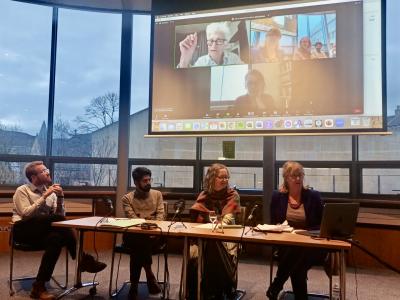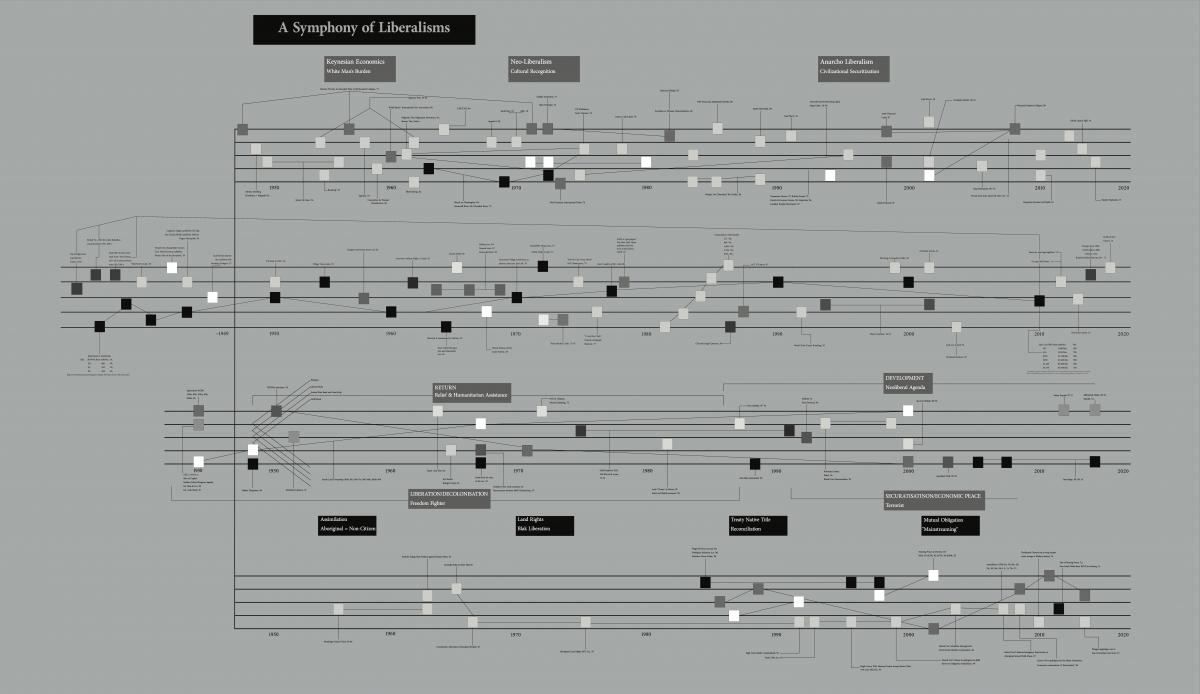
This event was co-organised by Dr Tom Metcalf (Junior Anniversary Fellow, IASH) and Dr Shakeel Anjum (RACE.ED Postdoctoral Fellow, IASH), featuring contributions from Prof. Elizabeth Povinelli (Franz Boas Professor of Anthropology, Columbia University), Prof. Nadia Abu El-Haj (Ann Olin Whitney Professor of Anthropology; Codirector of the Center for Palestine Studies, Columbia University), and Dr Morag Grant (Chancellor’s Fellow, Reid School of Music, Edinburgh), as well as the organisers. On 12 April 2023, a workshop was held to discuss and unpack the potential meanings and readings of Elizabeth Povinelli’s A Symphony of Liberalisms, featuring 5 speakers providing diverse disciplinary perspectives on this enigmatic text.
A Symphony of Liberalisms appears as ‘concept-image’ initially featuring in Elizabeth Povinelli’s Economies of Abandonment (2011) as a critique of liberalism, further expanding in Geontologies: A Requiem for Late Liberalism, one which demonstrates ‘a strange way of periodizing that creates an even stranger geography’ visible in the image of the Symphony (2016: 169). The Symphony is represented as what musicians would describe as a graphic score: a musical text used for performance which prioritises indeterminacy, pictorialism and/or abstraction, suffused with a maximising of the performer’s agency (in lieu of the traditional composer-performer hierarchy).
Each speaker presented for 10 minutes, interspersed by recordings of the Symphony interpreted and performed by pianist David Palmer. Following an introduction by Prof. Lesley McAra (Director, IASH), Elizabeth Povinelli offered some initial thoughts as to why the Symphony was created in the first place, noting compelled feelings of ‘intervention’ in the global discourses of liberalism through the image, describing it as a ‘citational tactic’ of resistance which builds upon the sonic philosophies of Deleuze and Guattari’s A Thousand Plateaus informed by her Catholic upbringing and exposure to Gregorian chant.
Following this, Tom Metcalf framed the Symphony within the larger practice of graphic scores since the 1950s, using a sociological framework of iconoclasm derived from Bruno Latour as well as the ‘image/picture’ distinctions of Norman MacLeod and W.J.T. Mitchell, focussed specifically on linking the concepts of ‘freeze-framing’ to (in)determinacy and notational practices in composition.
Nadia Abu El-Haj took the Symphony from a more distinctly political viewpoint, noting a concept of ‘civilisational rhetoric’ that embeds within late liberalism through the historic ‘repetition machines’ of religion, settler colonialism and dogma concerning Palestine which inform the discourses of power by advancing imaginations of settler-colonial temporalities of Zionism as a ‘derivate discourse’ of liberal sovereignty.
Morag Grant explored more historical aspects of music in relation to the Symphony, citing the notational and compositional practices of the 14th century (particularly of Guillaume de Machaut) as having synergy with Povinelli’s text. Suggestions were made which explore how the introduction of homophony, and subsequently ‘melody and accompaniment’ practices can be situated within the expansion of European colonialism, showing that the two histories could be deeply intertwined.
Finally, Shakeel Anjum spoke on the Black-Palestinian and global ‘subalternity’ that advances radical interruption of Symphony from the perspective of decolonial political philosophy emerging from the gathering of Palestinian resistance and Black radicalisms.

Discussion followed, with Povinelli claiming that we are no longer in a period of ‘late liberalism’, but something else, emergent and not yet definable. Other ideas included were how materiality and text can be at odds with one another, and how initially left-wing political developments and tactics have paradoxically become associated with expression of fascist governments.
The organisers are thankful to the Susan Manning Workshop Fund at IASH, Dr Ben Fletcher-Watson for his technical and logistical assistance, and Lesley McAra for her opening and closing remarks. The programme of the Symphony, which includes notes on the recorded interpretations, can be found here (opens as PDF), and the recordings are below.
A Symphony of Liberalisms - Interpretation 1
A Symphony of Liberalisms - Interpretation 2
A Symphony of Liberalisms - Interpretation 3
A Symphony of Liberalisms - Interpretation 4
A Symphony of Liberalisms - Geometric Transcription by Tom Metcalf
